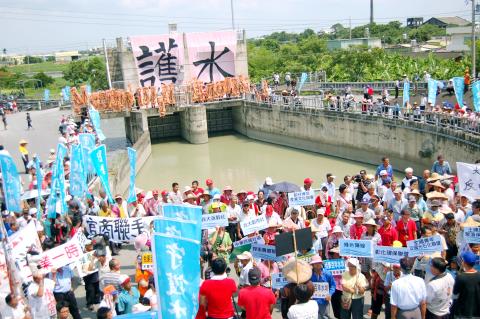Standing in front of a giant banner hanging from a water gate and emblazoned with the words “protect the water,” hundreds of farmers and farmers’ rights activists yesterday protested at the source of an irrigation channel in Changhua County’s Sijhou Township (溪州) over the Central Taiwan Science Park’s (CTSP) plans to divert water from the irrigation system.
“Water is already scarce and [the Changhua County Irrigation Association] only supplies water through irrigation channels four out of every 10 days,” Hsieh Pao-yuan (謝寶元), a farmer and president of the Alliance Against Water-Jacking by the CTSP, told the crowd. “With the CTSP planning to take more water from the irrigation channel, we Chang-hua farmers are going to be left with nothing — that is why we have to stand united and protect the water.”
Hsieh’s remarks drew a round of applause and cheers.

Photo: Liu Hsiao-hsin, Taipei Times
The farmers are worried because the association plans to build an underground aqueduct to supply more than 65,000 tonnes of water from the main Cizaipijun (莿仔埤圳) aqueduct to the latest campus in Erlin Township (二林).
The water in Cizaipijun comes from the Jhuoshui River (濁水溪) and is controlled by the water gate where yesterday’s rally was held.
Hsieh and other farmers are worried that the park’s diversion of the water could have a huge impact on farming families that depend on the irrigation channel to make a living.
“The Cizaipijun irrigation system supplies water to 180,000 hectares of farmland in southern Changhua County, including Sijhou, Erlin, Jhutang [竹塘], Dacheng [大城] and Fangyuan [芳苑] townships, which feed more than 30,000 farming families or more than 100,000 people,” Hsieh said. “The park said it would hire tens of thousands of people locally, but do they plan to feed so many people?”
The participants then performed a rite of worship to the river god, praying for him to protect the water.
Farming activist Yang Ju-men (楊儒門) questioned the legality of the plan to divert water from farms to industrial uses.
“Article 18 of the Water Act [水利法] stipulates that the allocation of water should follow the following order: first, family use; second, agricultural use; third, hydroelectric power plant use; and only then industrial and transportation use,” Yang said. “So it’s illegal to divert water from farms to the science park, especially when there is already insufficient water for irrigation.”
Sijhou Mayor Huang Sheng-lu (黃盛祿) accused the Irrigation Association of not informing residents before contracting out the aqueduct project.
He said, although the project was contracted out in December, the association only contacted the township office four months ago to ask if it could provide a venue for a public hearing.
Pointing to earlier comments by President Ma Ying-jeou (馬英九) that “if you care about the agricultural sector, you should not harm the farmers,” Taiwan Rural Front spokeswoman Tsai Pei-hui (蔡培慧) said that the lack of water was the most serious issue for farmers.
“The problem is not how much 1kg of bananas sells for, the real problem is that the government is trying to rob farmers of their land and water,” Tsai said.

Right-wing political scientist Laura Fernandez on Sunday won Costa Rica’s presidential election by a landslide, after promising to crack down on rising violence linked to the cocaine trade. Fernandez’s nearest rival, economist Alvaro Ramos, conceded defeat as results showed the ruling party far exceeding the threshold of 40 percent needed to avoid a runoff. With 94 percent of polling stations counted, the political heir of outgoing Costa Rican President Rodrigo Chaves had captured 48.3 percent of the vote compared with Ramos’ 33.4 percent, the Supreme Electoral Tribunal said. As soon as the first results were announced, members of Fernandez’s Sovereign People’s Party

EMERGING FIELDS: The Chinese president said that the two countries would explore cooperation in green technology, the digital economy and artificial intelligence Chinese President Xi Jinping (習近平) yesterday called for an “equal and orderly multipolar world” in the face of “unilateral bullying,” in an apparent jab at the US. Xi was speaking during talks in Beijing with Uruguayan President Yamandu Orsi, the first South American leader to visit China since US special forces captured then-Venezuelan president Nicolas Maduro last month — an operation that Beijing condemned as a violation of sovereignty. Orsi follows a slew of leaders to have visited China seeking to boost ties with the world’s second-largest economy to hedge against US President Donald Trump’s increasingly unpredictable administration. “The international situation is fraught

MORE RESPONSIBILITY: Draftees would be expected to fight alongside professional soldiers, likely requiring the transformation of some training brigades into combat units The armed forces are to start incorporating new conscripts into combined arms brigades this year to enhance combat readiness, the Executive Yuan’s latest policy report said. The new policy would affect Taiwanese men entering the military for their compulsory service, which was extended to one year under reforms by then-president Tsai Ing-wen (蔡英文) in 2022. The conscripts would be trained to operate machine guns, uncrewed aerial vehicles, anti-tank guided missile launchers and Stinger air defense systems, the report said, adding that the basic training would be lengthened to eight weeks. After basic training, conscripts would be sorted into infantry battalions that would take

GROWING AMBITIONS: The scale and tempo of the operations show that the Strait has become the core theater for China to expand its security interests, the report said Chinese military aircraft incursions around Taiwan have surged nearly 15-fold over the past five years, according to a report released yesterday by the Democratic Progressive Party’s (DPP) Department of China Affairs. Sorties in the Taiwan Strait were previously irregular, totaling 380 in 2020, but have since evolved into routine operations, the report showed. “This demonstrates that the Taiwan Strait has become both the starting point and testing ground for Beijing’s expansionist ambitions,” it said. Driven by military expansionism, China is systematically pursuing actions aimed at altering the regional “status quo,” the department said, adding that Taiwan represents the most critical link in China’s